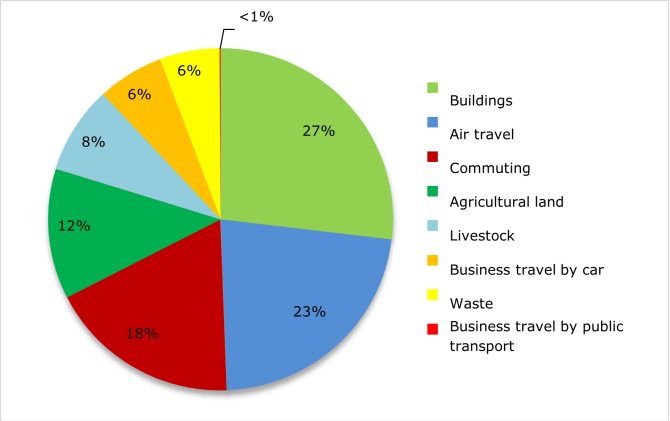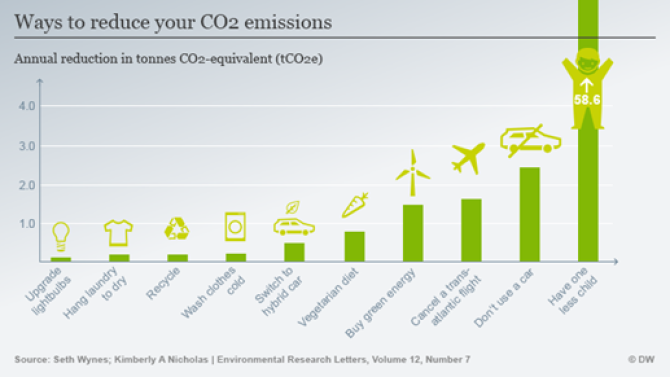WIMEK’s policy on reducing climate impact footprints
Background
Climate Change is one of the most pressing environmental problems for humanity. The IPCC scientific assessments indicate that global warming of 2°C will be exceeded during the 21st century, unless rapid and deep reductions in greenhouse gas emissions occur in the coming decades. The Wageningen Institute for Environment and Climate Research (WIMEK) studies climate mitigation and adaptation and considers “Climate Action” as a main challenge to contribute to. WIMEK aims to contribute to this not only through research and teaching, but also by promoting actions to reduce the footprint. WIMEK wants to provide inspiring and good examples of policies aimed at reducing the climate impact footprint. In this short note, we present the WIMEK aims and actions to reduce its climate impact.
Wageningen University aims to be a sustainable university. It aims to be as energy neutral as possible with its own windmill park, geothermal energy storage system and impressive roof area covered with solar panels. On campus, there are numerous examples of sustainable construction, energy efficiency and innovations in the field of sustainability. The campus is 80% climate neutral. Nevertheless, the emission of greenhouse gasses by WUR is still substantial (41 kton CO2 in 2019). Almost half of the greenhouse gas emissions at WUR originate from travel (by plane, car and public transport). Other sources are buildings and agricultural land (Figure 1).

Figure 1. CO2 emissions of WUR by operational activities in 2019
So, what can we do?
There are many ways to reduce our climate footprint (Figure 2). For WIMEK, the most effective policies are related to traveling and food consumption. Air travel is responsible for 23% of WUR’s CO2 emissions. So, a substantial decrease of our business travel by air will be most effective to reduce our climate impact footprint. A study of Diana Ivanova et al1 shows that taking one intercontinental return flight produces more emissions than can be saved by two people going vegan for a whole year. So, air travel contributes substantially to the carbon footprint of individuals.
1 Diana Ivanova et al 2020 Environ. Res. Lett. 15 093001

Figure 2. Ways to reduce CO2 emissions
WUR policy on mobility
WUR developed a mobility plan 2030 and a mobility implementation agenda 2018-2022.
In the period 2018-2022, WUR aims to more firmly and actively dedicate itself to making mobility on Wageningen Campus more sustainable. Measures to achieve this objective focus on:
- Encouraging cycling (including electric);
- Encouraging the use of public transport;
- Discouraging car use for commuting from home to work and for business travel;
- Facilitating alternatives to air travel and other business travel methods;
- Making transport options more sustainable.
Current and implemented measures at WUR level are:
- In principle, all business trips will be taken using public transport, unless the destination is difficult to reach by train and the travel time is twice as long as it would be if the employee’s own mode of transport were used (WUR Implementation Regulations for Business Trips).
- Taking the train for business trips in Europe with destinations that can easily be reached by rail, e.g. Brussels, Paris, and Frankfurt (Wageningen University & Research Travel Policy).
- WUR aims to give sustainable travel an extra push by stimulating electric driving, cycling and the use of public transportation. This includes shared vehicles and efficient use of transportation for business purposes. You can find an overview of the current options at the WUR website Mobility as a Service.
- Facilitating and encouraging teleconferences and video conferences
WIMEK Policy
WIMEK would like contribute to lowering the climate footprint of WUR. WIMEK wants to encourage staff and PhD candidates to critically reflect on the urgency of the climate issue when taking on research and teaching activities. Moreover, WIMEK aims to contribute actively to the debate on climate action within and outside of WUR level. This implies an ongoing reflection on traveling and (food) consumption patterns. When planning trips and meetings, WIMEK will encourage people to consider the environment, and think reaching the same goals by environmentally friendly alternatives. WIMEK aims to do this as follows:
Climate smart traveling
- WIMEK encourages staff and students to travel in the most environmentally friendly way. We preferably do not fly when not needed, and not to destinations that can be reached in less than six - eight hours by train. For necessary air travel, we book direct flights (if possible) and use the gold standard to compensate our climate impact.
- WIMEK encourages the use the eclectically powered shared Amber cars for business travel. Two hubs have been designated on WUR campus for this purpose. See WUR Mobility as a Service.
- WIMEK encourages the use bicycles for short distance travel: there are ten bicycle hubs on WUR campus and one at the Leeuwenborch. See WUR Mobility as a Service.
Online and hybrid meetings, when possible
- WIMEK supports online conference tools and networking opportunities and the organisation of 'hybrid' conferences (partly physical, partly online).
- WIMEK will encourage PhD candidates to look for low carbon footprint options when organising PhD trips and other events.
WIMEK Climate Action Award
- WIMEK will organise an annual award ceremony for the most outstanding sustainability action by our chair groups, that goes another step further in sustainable low carbon footprint policy.
Advisory and assessment committees
- For advisory and assessment committees, WIMEK will first look for members who can travel to Wageningen by train or by car easily and if that is the case WIMEK will discourage air travel.
Climate smart food & drinks / catering
- As meat has a large climate footprint, WIMEK will only serve tasty and healthy vegetarian or vegan meals at all WIMEK PhD courses and events.
- WIMEK promotes waste reduction wherever possible, for instance by promoting dishwasher friendly reusable dishes and cups at courses and meetings, and to provide WIMEK mugs for free.
Response: send your response to WIMEK@wur.nl